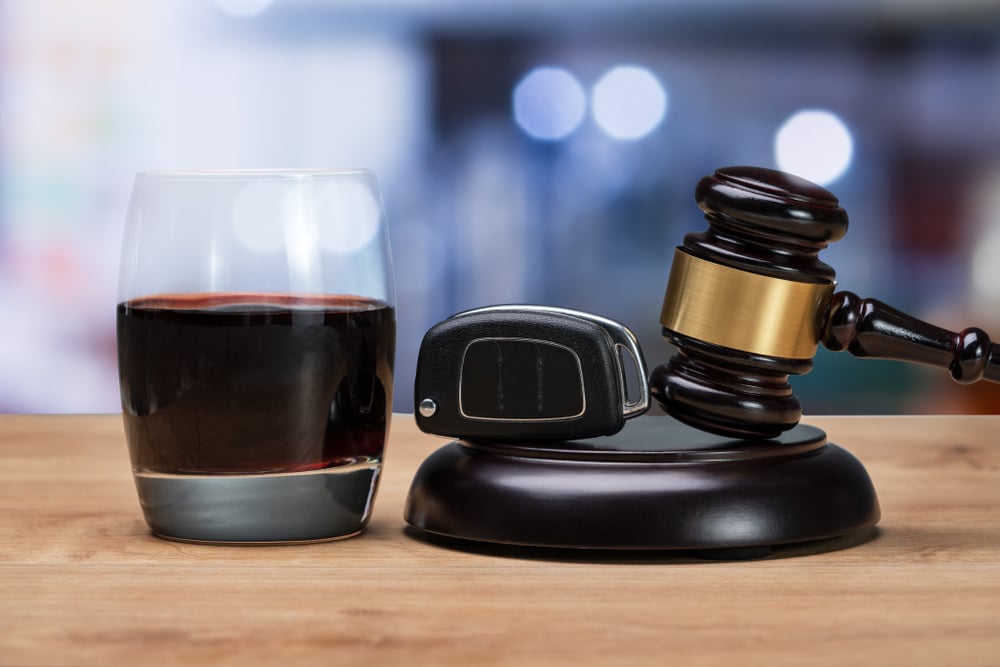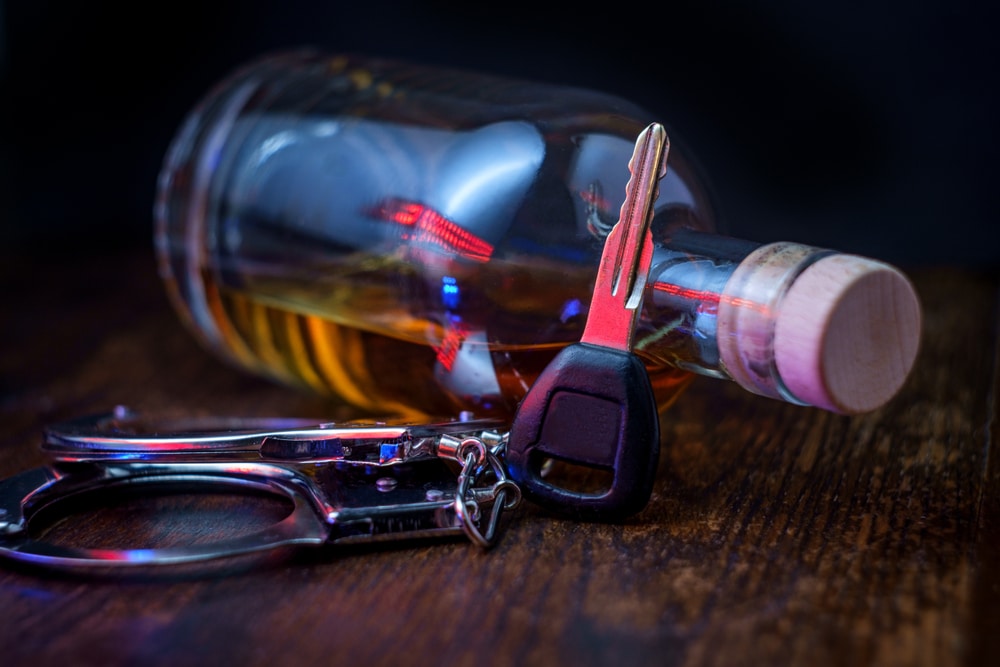
Nevada has strict laws and penalties for driving under the influence (DUI) of alcohol or drugs. The legal limit for blood alcohol concentration (BAC) is 0.08% for drivers aged 21 and over, and 0.02% for drivers under 21. Nevada also has a zero-tolerance policy for drivers under 21, meaning any detectable amount of alcohol can result in a DUI charge.
Law enforcement officers in Nevada are trained to identify and apprehend impaired drivers. They use various methods, including sobriety checkpoints, saturation patrols, and targeted enforcement in high-risk areas. Officers may also use field sobriety tests and breathalyzer tests to determine if a driver is impaired.
Penalties for a DUI conviction in Nevada can include fines, jail time, license suspension, and mandatory education or treatment programs. Repeat offenders face harsher penalties, including longer jail sentences and longer license suspensions.

0.08% or higher for regular drivers and 0.04% for commercial drivers

No

90 days

Mandatory

Yes (0.18%+)
Nevada has a significant problem with impaired driving, particularly in urban areas such as Las Vegas and Reno. According to data from the Nevada Department of Transportation, there were 4,688 alcohol-related crashes in the state in 2020, resulting in 128 fatalities and 2,583 injuries.
To combat this problem, Nevada has implemented various initiatives and programs aimed at reducing impaired driving. These include public education campaigns, increased enforcement efforts, and partnerships with community organizations and advocacy groups.
Despite these efforts, impaired driving remains a persistent problem in Nevada. Factors contributing to this include the state’s 24-hour entertainment and nightlife culture, the prevalence of alcohol at casinos and resorts, and the high number of tourists and visitors who may be unfamiliar with the state’s laws and regulations.
Nevada’s DUI laws and penalties are among the strictest in the nation. A first-time DUI offense can result in a fine of up to $1,000, up to six months in jail, and a 90-day license suspension. Offenders may also be required to attend a DUI school or treatment program and install an ignition interlock device on their vehicle.
Penalties for subsequent DUI offenses are even harsher. A second DUI offense within seven years can result in a fine of up to $5,000, up to 18 months in prison, and a one-year license suspension. A third DUI offense within seven years is a felony and can result in a fine of up to $5,000, up to six years in prison, and a three-year license suspension.
In addition to criminal penalties, a DUI conviction can also have significant collateral consequences, such as increased insurance rates, employment difficulties, and social stigma. Offenders may also face civil lawsuits if their actions result in injury or property damage to others.
Nevada law provides for enhanced penalties in certain circumstances, such as when a DUI offense results in injury or death, or when the offender has a high BAC level. For example, a DUI offense resulting in substantial bodily harm or death is a felony and can result in a prison sentence of up to 20 years.
Nevada law also has special provisions for commercial drivers and drivers under 21. Commercial drivers are subject to a lower BAC limit of 0.04%, and any detectable amount of alcohol can result in a DUI charge for drivers under 21.
In addition, Nevada law allows for the use of “aggravating factors” in sentencing for DUI offenses. These factors can include prior DUI convictions, high BAC levels, and the presence of children in the vehicle at the time of the offense.
Nevada law enforcement employs a multi-faceted approach to DUI detection and enforcement. Officers undergo specialized training in standardized field sobriety testing (SFST) and advanced roadside impairment detection enforcement (ARIDE). Regular patrols are supplemented with saturation patrols in high-risk areas.
The state conducts frequent sobriety checkpoints, particularly during major events and holidays. These checkpoints must follow strict constitutional guidelines and are typically announced in advance as required by law. Multi-jurisdictional task forces coordinate efforts across county lines.
Mobile DUI processing units, known as “BAT mobiles” (Blood Alcohol Testing mobiles), allow officers to conduct testing and processing in the field, increasing efficiency and reducing transport time to stations.
Nevada law enforcement utilizes state-of-the-art breath testing equipment, including the Intoxilyzer 8000, which must be calibrated and maintained according to strict state standards. Blood testing is conducted at certified laboratories following chain of custody protocols.
Preliminary breath testing devices (PBTs) are used roadside for probable cause determination. These results, while not admissible in court for proving guilt, can justify arrest and further testing. Body-worn cameras are mandatory during DUI stops and provide crucial evidence for prosecution.
Advanced vehicle monitoring systems, including automated license plate readers (ALPRs), help identify suspended drivers and those required to have ignition interlock devices. Drug recognition experts (DREs) use specialized techniques and equipment to detect drug impairment.
Nevada offers various treatment options for DUI offenders, ranging from education programs for first-time offenders to intensive outpatient and residential treatment for repeat offenders. Programs must be certified by the state and follow evidence-based practices.
The state employs a clinical assessment process to determine appropriate treatment levels. Factors considered include BAC level, prior offenses, substance abuse history, and mental health concerns. Programs typically combine education, counseling, and behavioral modification techniques.
Specialty courts, including DUI courts, provide intensive supervision and treatment for high-risk offenders. These programs show higher success rates in reducing recidivism compared to traditional probation.
First-time offenders must complete a minimum of 8 hours of alcohol education and awareness programs. Second offenses require completion of an intensive outpatient program lasting at least 42 hours over several weeks.
Felony DUI offenders must complete residential treatment programs while incarcerated, followed by intensive outpatient treatment upon release. All treatment providers must maintain certification through the state’s substance abuse prevention and treatment agency.
Treatment plans often include random drug and alcohol testing, regular counseling sessions, and progress monitoring. Failure to comply with treatment requirements can result in additional penalties and program extensions.


Nevada utilizes various monitoring technologies and methods to ensure offender compliance. These include SCRAM (Secure Continuous Remote Alcohol Monitoring) devices, random drug testing, and regular check-ins with probation officers.
Ignition interlock devices must meet state specifications and include cameras to verify the identity of users. Data from these devices is regularly reviewed for compliance. GPS monitoring may be required for high-risk offenders.
The state maintains a centralized database tracking compliance with court-ordered programs, treatment attendance, and monitoring requirements. Violations trigger swift consequences, including possible jail time.
The Department of Motor Vehicles (DMV) handles license revocations and restrictions independently of criminal proceedings. After a DUI arrest, drivers have seven days to request an administrative hearing to contest license suspension.
Administrative license revocation occurs regardless of criminal case outcome. Drivers must complete all required programs and pay reinstatement fees before license restoration. The DMV maintains separate records of administrative actions.
Temporary licenses may be issued for work or essential travel, subject to strict limitations and monitoring requirements. Commercial drivers face additional administrative penalties and reporting requirements.
The Nevada DMV maintains strict procedures for DUI case processing. Upon arrest, officers immediately seize the driver’s license and issue a temporary driving permit valid for seven days. During this period, drivers must request an administrative hearing or face automatic license suspension.
Administrative hearings are conducted by DMV hearing officers and focus solely on the legality of the stop, probable cause for arrest, and proper testing procedures. These hearings are separate from criminal proceedings and operate under different evidentiary standards.
Documentation requirements include arrest reports, chemical test results, and officer statements. The burden of proof in administrative hearings is lower than in criminal court, requiring only a preponderance of evidence.
Criminal DUI cases begin in Justice Court for misdemeanors or District Court for felonies. Initial appearances must occur within 72 hours of arrest, where defendants are informed of charges and rights. Plea negotiations typically occur between defense counsel and prosecutors.
Discovery processes include access to police reports, video evidence, and testing records. Defendants may challenge evidence through various pretrial motions, including motions to suppress evidence or dismiss charges based on procedural violations.
Trial rights include jury selection for misdemeanors and felonies. The state must prove guilt beyond a reasonable doubt. Sentencing follows state guidelines but may be modified based on aggravating or mitigating factors.
The Nevada Department of Public Safety oversees DUI enforcement efforts statewide, coordinating with local law enforcement agencies. The Office of Traffic Safety provides funding and resources for enforcement programs and public education campaigns.
The Department of Motor Vehicles handles administrative licensing actions and maintains driving records. The Division of Public and Behavioral Health certifies and monitors treatment providers and programs.
The Nevada Highway Patrol leads specialized DUI enforcement efforts on state highways and assists local agencies with checkpoints and saturation patrols. The State Crime Laboratory provides forensic testing services for blood samples.
Nevada’s DUI laws interact with other states through the Interstate Driver License Compact. Out-of-state convictions are reported to Nevada authorities and count toward repeat offense calculations. Similarly, Nevada reports convictions to other member states.
Visitors arrested for DUI in Nevada must comply with state requirements despite residence elsewhere. The state may require electronic monitoring or treatment program participation regardless of logistical challenges for out-of-state residents.
Border considerations affect enforcement, particularly near California, Arizona, and Utah. Cross-border pursuit protocols and evidence handling procedures follow specific interstate agreements.
Nevada’s tribal lands present unique jurisdictional challenges for DUI enforcement. Tribal police have authority over tribal members, while state authorities maintain jurisdiction over non-members on tribal lands. Coordination agreements facilitate enforcement.
Federal lands, including military bases and national parks, involve overlapping jurisdiction with federal authorities. Cases may be prosecuted in federal court depending on location and circumstances.
Tourist-heavy areas like Las Vegas require special consideration for out-of-state offenders, including modified monitoring requirements and interstate compact agreements for supervision.
DUI convictions carry significant financial burdens. Direct costs include fines, court fees, attorney fees, and treatment program expenses. First-offense costs typically range from $5,000 to $10,000, while subsequent offenses can exceed $20,000.
Installation and maintenance of ignition interlock devices cost approximately $100 monthly. Insurance premium increases following a DUI conviction can last several years and double or triple rates. License reinstatement fees and SR-22 insurance requirements add additional expenses.
Lost wages from jail time, court appearances, and license suspension impact both individuals and employers. Property damage and civil liability from DUI accidents can result in substantial financial obligations.


Nevada communities bear significant costs from DUI incidents, including emergency response resources, medical care for victims, and criminal justice system expenses. Annual costs to taxpayers exceed millions of dollars in law enforcement and court resources.
Victim impact extends beyond immediate injuries to long-term rehabilitation costs and lost productivity. Families of both victims and offenders face emotional and financial challenges, often requiring social services support.
Public safety campaigns, prevention programs, and monitoring systems require substantial ongoing funding. These costs are partially offset by fines and fees but remain a significant burden on state and local budgets.
Nevada legislators regularly review and update DUI laws to address emerging challenges. Recent focus areas include lowering the BAC limit to 0.05%, expanding ignition interlock requirements, and increasing penalties for drug-impaired driving.
Technological advances in detection and monitoring continue to influence enforcement strategies. The state is exploring advanced roadside drug testing methods and real-time impairment detection systems.
Legislative proposals often address specific issues like marijuana impairment standards and enhanced penalties for repeat offenders. Public safety concerns drive ongoing policy discussions.
Nevada increasingly relies on digital case management systems to track DUI offenders across jurisdictions. Electronic monitoring technologies continue to evolve, offering more accurate and cost-effective supervision options.
Virtual court appearances and remote alcohol monitoring have expanded, particularly following COVID-19 adaptations. These technologies improve efficiency while maintaining accountability.
Automated license plate readers and traffic monitoring systems help identify high-risk drivers. Integration of various databases improves information sharing between agencies.
Marijuana legalization has complicated DUI enforcement, requiring new testing methods and impairment standards. Officers receive specialized training in detecting drug impairment, including prescription medications.
Rideshare services impact DUI patterns, particularly in urban areas. The state continues to evaluate transportation alternatives and their effect on impaired driving rates.
New vehicle technologies, including autonomous features and built-in impairment detection systems, present both opportunities and challenges for enforcement.
Nevada implements comprehensive DUI prevention programs targeting various age groups and demographics. School-based education programs focus on teenage drivers, while public awareness campaigns address adult populations.
The state partners with businesses, particularly in the hospitality industry, to promote responsible service and alternative transportation options. Training programs for alcohol servers are mandatory.
Community-based initiatives include victim impact panels, peer education programs, and designated driver campaigns. These efforts receive both public and private funding.
DUI convictions can significantly impact employment opportunities, particularly in positions requiring driving or professional licenses. Commercial drivers face extended license suspensions and possible career ending consequences.
Background checks commonly reveal DUI convictions, affecting job applications and security clearances. Some professions, including healthcare and education, have specific restrictions regarding DUI convictions.
Employees may face termination or disciplinary action following a DUI conviction, especially if driving is an essential job function. Time off requirements for court appearances and treatment programs can strain employment relationships.
Nevada tracks treatment program outcomes through recidivism rates and completion statistics. Programs combining education, counseling, and monitoring show higher success rates in preventing repeat offenses.
Evidence-based treatment approaches include cognitive behavioral therapy, motivational interviewing, and substance abuse education. Program effectiveness varies based on individual factors and level of participation.
Regular program evaluations help identify successful interventions and areas needing improvement. Treatment providers must maintain specific success rates to maintain state certification.
DUI convictions in Nevada typically result in significant insurance premium increases lasting 3-5 years. Insurance companies may classify offenders as high-risk drivers, leading to rates two to three times higher than standard premiums.
Some insurance companies may cancel coverage following a DUI conviction, forcing offenders to seek high-risk insurance providers. The state requires continuous insurance coverage with increased liability limits for DUI offenders.
Policy restrictions may include exclusion from certain coverage types or higher deductibles. Multiple DUI convictions can make obtaining affordable insurance extremely difficult.


Nevada requires SR-22 insurance certification for DUI offenders, proving continuous financial responsibility. This requirement typically lasts three years for first offenses and longer for subsequent violations.
SR-22 filings must be maintained without lapse, and any cancellation results in immediate license suspension. Insurance companies automatically notify the DMV of coverage changes or cancellations.
The cost of SR-22 filing adds to insurance expenses, with annual filing fees and higher premiums. Drivers must maintain coverage even if they no longer own a vehicle.
DUI convictions impact various aspects of daily life beyond legal consequences. Transportation challenges affect work, family obligations, and social activities, particularly during license suspension periods.
Travel restrictions can limit employment opportunities and personal mobility. Border crossing and international travel may be restricted, especially to countries with strict entry requirements regarding DUI convictions.
Financial strains from fines, fees, and increased insurance costs often affect family budgets for years. Social stigma and professional reputation damage can have lasting personal and career implications.
Nevada’s approach to DUI enforcement combines strict legal consequences with rehabilitation opportunities. The state’s comprehensive system includes multiple enforcement agencies, advanced detection technologies, and various treatment options designed to reduce recidivism.
The financial impact of a DUI conviction extends far beyond initial fines and fees, affecting insurance costs, employment opportunities, and long-term economic stability. Administrative procedures work in parallel with criminal proceedings, creating a dual-track system of accountability.
Treatment programs and monitoring technologies continue to evolve, offering more effective rehabilitation options while maintaining public safety. The state’s focus on prevention and education complements enforcement efforts, particularly in high-risk areas and during major events.
Interstate considerations and special jurisdictional issues add complexity to enforcement efforts, requiring coordination between various agencies and jurisdictions. Emerging issues, including marijuana impairment and new vehicle technologies, continue to shape policy developments.
The comprehensive nature of Nevada’s DUI laws reflects the state’s commitment to reducing impaired driving while providing opportunities for rehabilitation. Ongoing legislative updates and technological advancements demonstrate the dynamic nature of DUI enforcement and prevention efforts in the state.
At DUI 101, our mission is to empower you with the knowledge needed to make informed decisions during this challenging time. Explore our articles and guides to better understand your situation and the steps ahead.
© 2024 Chapman SEO LLC. This website is for educational and informational purposes only. All content is created using AI technology and maintained by non-lawyers and should not be considered legal advice. The information provided is general in nature and may not be suitable for your specific situation. Always consult with a qualified legal professional for advice regarding your individual circumstances. We do not create attorney-client relationships through this website. By using this site, you acknowledge that you have read and understand these terms.